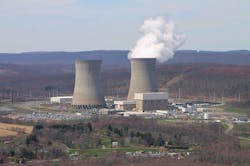Cumulus marks Construction milestone for direct Nuclear power-supplied Data Center
Talen Energy’s spinoff Cumulus Data is making significant construction progress on its new Pennsylvania data center that will be directly powered by nearby and carbon-free nuclear energy, the company said.
Cumulus reported that it’s completed the powered shell for phase one of its 48-MW data center in Susquehanna. The 300,000-square-foot facility is available for lease soon and includes numerous fiber optic routes in service.
The data center industry is one of the largest energy demand users in the world, as servers require vast amounts of electricity operating usually all day, every day. This Cumulus facility will be unique in that it will be directly connected to electricity generated from Talen’s Susquehanna nuclear power station.
Nuclear reactors do not emit carbon dioxide or other greenhouse gases during the generation process. Plant operations costs can be high, but fuel rods are considered high in energy density, high-percentage capacity factor and low in relative economic costs once in use.
“Our flagship Cumulus Susquehanna data center campus is positioned to welcome its first tenant and commence commercial operations this year,” said CEO Alejandro Hernandez in a statement. “We look forward to advancing our mission to solve the energy ‘trilemma’ which we define as the rapidly increasing consumer demand for zero-carbon, low-cost, and reliable electricity by data center customers, beginning with our first Cumulus Susquehanna data center campus.”
Talen Energy, a spinoff of utility holding company PPL Corp. years ago, is owner and operator of the two-unit Susquehanna Nuclear Station. The power plant was commissioned in the early 1980s and utilizes two General Electric boiling water reactors.
More stories on the future potential of Nuclear Power in the C&I Energy Transition
New Frontier Perspectives: Are Nuclear-powered Data Centers on the Horizon?
We have Fusion Ignition: Lawrence Livermore National Lab celebrates Net Energy Gain in experiment
Idaho National Lab study favorable on Nuclear Microgrids
Susquehanna Nuclear generates close to 20 million MWh of carbon-free power annually. Nuclear power accounts for 20 percent of all U.S. electricity resources and generates more than half of the nation’s carbon-free utility-scale energy.
The direct connection helps offer a lower total cost of ownership when energy costs are factored in, a company officer pointed out. Data Halls 1 and 2 are expected to ready for service in the third quarter.
The data center should be energized during this quarter, according to reports.
Many industry experts argue that directly connected nuclear is advantageous for the data industry, which consumes 8,000 GWh (8 million MWh) annually for disk storage alone. Some certainly say that renewable energy is a more viable, attractive option, but the value of carbon-free is a tremendous consideration all around.
“I feel strongly that nuclear power could be an alternative power option for many dense data center markets,” Brad Alexander, chief technical officer of South Carolina-based edge colocation data-center owner DartPoints, said in a Q&A with EnergyTech sister publication Data Center Frontier last year. “Power purchase agreements for densely populated data center areas could be a very attractive option that would provide ongoing sustainable nuclear power to many providers in metro regions.”
Cumulus Data hopes to pioneer the nuclear direct-connection data center with the Pennsylvania project, then explore opportunities to duplicate that in other regions of the U.S.
The nation has 92 nuclear reactor units at more than 50 power plants in 28 states, according to the U.S. Energy Information Administration. Some countries, including France and several eastern European sovereigns, generate more than half of their total electricity from nuclear power plants.
-- -- --
(Rod Walton, senior editor for EnergyTech, is a 15-year veteran of covering the energy industry both as a newspaper and trade journalist. He can be reached at [email protected]).
Follow us on Twitter @EnergyTechNews and @rodwaltonelp and on LinkedIn.
About the Author
Rod Walton, EnergyTech Managing Editor
Managing Editor
For EnergyTech editorial inquiries, please contact Managing Editor Rod Walton at [email protected].
Rod Walton has spent 17 years covering the energy industry as a newspaper and trade journalist. He formerly was energy writer and business editor at the Tulsa World. Later, he spent six years covering the electricity power sector for Pennwell and Clarion Events. He joined Endeavor and EnergyTech in November 2021.
Walton earned his Bachelors degree in journalism from the University of Oklahoma. His career stops include the Moore American, Bartlesville Examiner-Enterprise, Wagoner Tribune and Tulsa World.
EnergyTech is focused on the mission critical and large-scale energy users and their sustainability and resiliency goals. These include the commercial and industrial sectors, as well as the military, universities, data centers and microgrids. The C&I sectors together account for close to 30 percent of greenhouse gas emissions in the U.S.
He was named Managing Editor for Microgrid Knowledge and EnergyTech starting July 1, 2023
Many large-scale energy users such as Fortune 500 companies, and mission-critical users such as military bases, universities, healthcare facilities, public safety and data centers, shifting their energy priorities to reach net-zero carbon goals within the coming decades. These include plans for renewable energy power purchase agreements, but also on-site resiliency projects such as microgrids, combined heat and power, rooftop solar, energy storage, digitalization and building efficiency upgrades.

